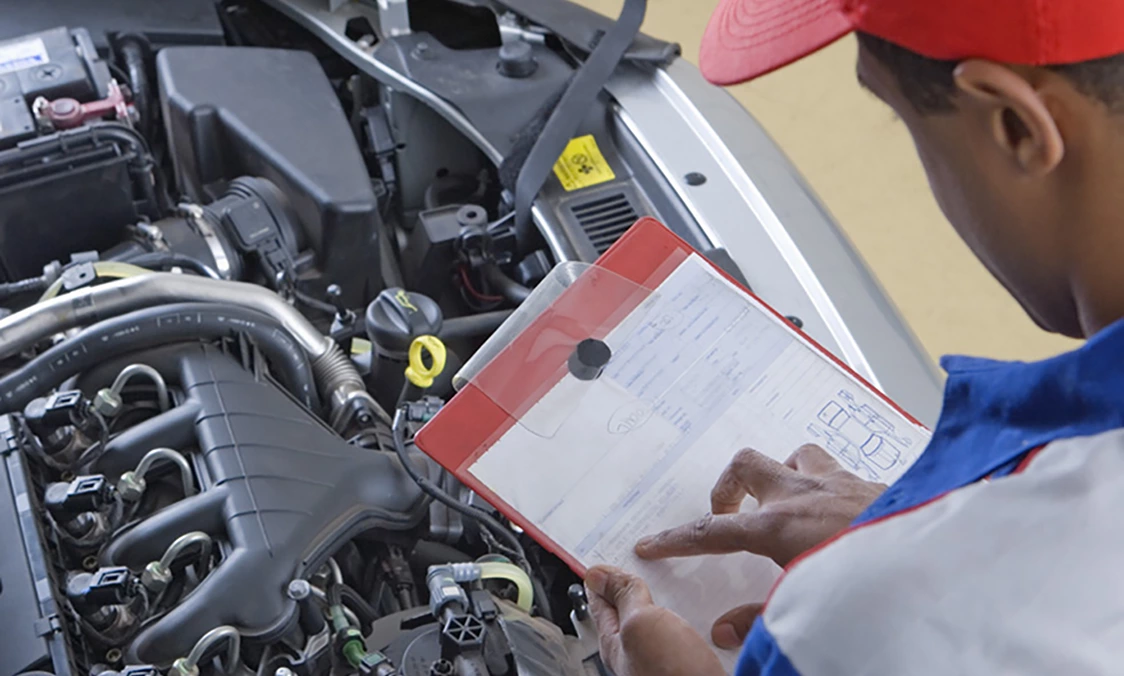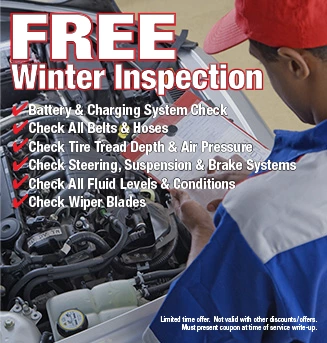Timing Belt
January 21, 2020
Ever heard the sad tale of a staggeringly steep repair bill from a broken timing belt? Bad news. Let's take a lesson from their woes and remember to think about our timing belt.
First, let's review what a timing belt does. The top part of the engine over the cylinders is called the cylinder head. The head contains the valves. There's at least one valve that lets the fresh air into the cylinder. This air, mixed with fuel, burns to create power. Then another valve or two will open to allow the exhaust out of the engine. Each cylinder has 2 to 4 valves - that's 12 to 24 valves for a V-6, up to 32 values on a V-8. The opening and closing of the valves is done by a camshaft. The timing belt uses the rotation of the engine to drive the camshaft which opens and close the valves. It's called a timing belt because it has to be adjusted to rotate the camshaft to keep proper time with the engine so that everything's in sync.
The timing belt is a toothed rubber belt. But some vehicles use a timing chain or timing gears instead of a belt. Timing chains and gears are much more durable, but vehicle manufactures are using belts more because they are quieter - and cheaper. If you have a small or mid-sized passenger car, crossover or mini-van, chances are you have a timing belt.
Unfortunately, timing belts fail without any warning. That shuts your engine down right away. Your pros at Auto Lab Troy can inspect your timing belt and look for cracks and looseness. But getting to the belt to take a look can be almost as much work as changing it on some vehicles. That's why manufacturers recommend replacing the belt from time to time. For most vehicles it's from 60,000 to 90,000 miles or 95,000 to 145,000 kilometers. If your owner's manual doesn't specify an interval, ask your service advisor at Auto Lab Troy.
Someone we know, who shall remain anonymous, has had two timing belts fail. The first was while he was waiting at a stop light - that repair cost several thousand dollars. The second was while driving on the highway - that one cost more than twice as much. Both had the cars out in the shop for three weeks. His cars had what we call "interference engines," meaning that the valves and pistons are very close to each other. If the timing belt slips even one notch, the pistons will slam into the open valves. That's why our friend's highway failure was so much more - his engine was traveling so fast that the valves were smashed and they chewed up the cylinder head.
A non-interference engine will just shut down if the timing belt breaks. You're stranded, but the engine doesn't suffer permanent damage. In both cases, our hapless friend was just a couple oil changes past the recommended interval for changing the timing belt. This is one of those things that Troy drivers just cannot put off. Now replacing a timing belt is not cheap - but repairs for a broken belt can be far more expensive.
The team at Auto Lab Troy recommends Troy drivers check their owners' manual ASAP - especially if you have more than a 60,000 miles or 95,000 kilometers. You may need to get that belt replaced right away. And on many cars, the timing belt drives the water pump. So, it may be a good idea to replace the water pump while you're at it because 90% of the work required for the new pump is already done with the belt change. Doing both at the same time saves you a lot of money because as they say, "timing's everything."
Auto Lab Troy
2790 West Maple Rd.
Troy, Michigan 48084
(248) 643-7690
Need Service?
More articles from Auto Lab Troy

It's (Not) Complicated (Engine Air Filter)
December 22, 2024
While many components of your vehicle are complex and composed of lots of mechanical and electrical parts, there's one that isn't complicated but still important. It's your engine air filter. (And, we should point out, the engine air filter isn't to be confused with the cabin air filter. The ca... More

Putting a Stop to Brake Problems (Brake Service)
December 15, 2024
It's safe to say that most drivers take their brakes for granted. You press on the brake pedal and the vehicle slows down or stops. It's easy to see why it is so important for your vehicle's brakes to be working correctly. Brakes are an important safety feature of any vehicle. When it comes to... More

Why is Air Not Coming Out of My Vents?
December 8, 2024
You climb inside your vehicle, start the ignition, and reach for the fan control for the heating or air conditioning. But when you try to crank it up, no air comes out of the vents. It can make for a very uncomfortable trip, whether its hot or cold outside. Its important for the comfort of you a... More










